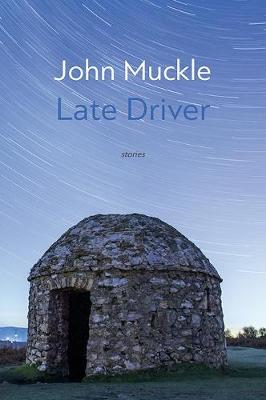Late Driver
John Muckle
(Shearsman Books Ltd., 2020); pbk, £12.95
There is nothing extraordinary about Highfields housing estate in Honiton, near Dunkswell, situated close to a military airfield in Devon which acts like a centrifugal force on the lives of the residents. Yet John Muckle, poet, writer, editor, animates the lives of the most ordinary characters in the most extraordinary ways as they gravitate around this curious setting in his most recent collection of short stories Late Driver. To read this collection is to feel neighbourly; nipping in and out, twitching the curtain to observe, or in sequence, absorbing the intricate connections of fascinating lives lived, revisited, and lost across time and through place.
Muckle’s gentle colloquialisms and poetics flash a palinopsia in the mind that leaves you blinking to clear the emotional fall-out of each life explored, as if bereaved in some way.
The collection is established in the opening story ‘Snowballs in June’ where we are taken by the hand and led through the estate by a protracted sentence which mimics the trajectory of the streets:
The Highfields Estate was a sprawling congeries of small, sand-coloured bungalows and houses ranged along tongue curving roads that were laced by narrow alleys, sheltered and shaded by dark shrubs and trees […] All of which lent it a feeling of justified warmth and safety.
The intimation of ‘warmth and safety’ rests with the word ‘lent’ and we sense the superficiality and quiet sadness of the blissful façade; the untruths that we tell ourselves daily. Pauline and Bill’s bungalow houses ‘a short windowless corridor that had once been box room […]’, an effective metaphor for that which is outside of conscious awareness but intuited on a deeper level as Pauline, who is ‘wool gathering’ at the end of her life, cannot ignore ‘the darkness of the resultant corridor.’
‘The Irons’ introduces Bill’s brother, Ray, through a ‘[…] photograph, blown and framed through a tiny original […]’. Through Ray, Muckle widens the focus on Bill and Pauline’s life, introducing new complexities and characters in a narrative legacy. It is here we learn more of Mikey, their son, only to meet him face to face in ‘The Good Son’. A product of his environment, Mickey is a working-class racist with a ‘[…] fragile sense of self-worth […]’ who enjoys his work as a ‘ganger’. His friendship with Bobby, and the disabled Judy seems unlikely, yet they have enriched his existence: ‘Mikey had been plain Mike until Bobby and Judy came into his life.’ But it is Muckle’s revelations of Mickey’s dichotomous, hidden layers that astonish us as we learn: ‘The rings of Saturn never bored him.’
In ‘A Lady from Des Moines’, Muckle glides back to the airfield during the second world war and examines the legacy of childhood. A military nurse and proud American living with the Dunns in Dunkswell, Eileen Platt can’t escape the shadows that her brother cast in both life and death. When she returns home for her overbearing father’s funeral, she questions her entitlement to pursue a life of her own as her mother informs her: ‘Your father asked for you at the end. But of course, you had more important things on your mind.’ In ‘Fire in the Hole’ we revisit Eileen in her twilight years as: ‘She sat there remembering, a small dark figure in a chair beside the only light in the room […]’.
In the titular finale, Pauline’s world is reframed as she goes about her daily business. We learn that she ‘[…] didn’t learn to drive until later in life’, a metaphor for the acceptance of her lot, as she: ‘subsided into a truce for the sake of what she really wanted.’ Muckle takes us full-circle, exposing the inevitable–we are but a collection of memories when the time comes.
Wanda McGregor


Leave a Reply